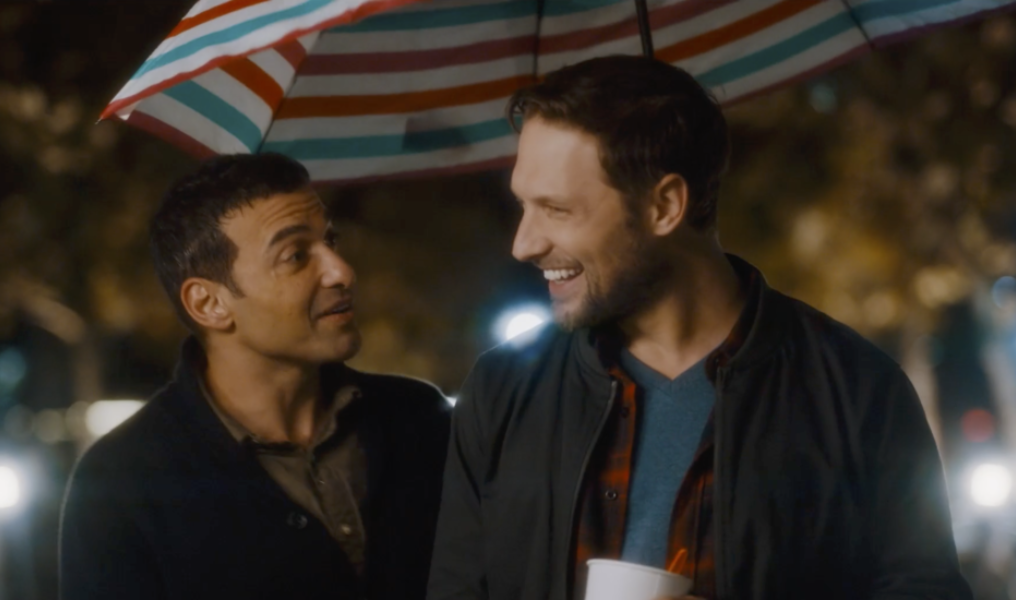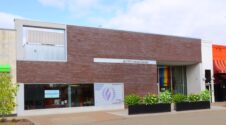American films about queerness, Islam and Arab identity are relatively rare. Rarer still are ones that don't treat these two identities' overlap as a social or personal problem to be solved: an implicit tension fraught with hardship. All of this makes "Breaking Fast," Dearborn native Mike Mosallam's buoyant West Hollywood-set romantic comedy, which unfolds over the month of Ramadan with a largely Arab cast, singular not just in content but in tone.
"We're not hiding the fact that we're following some very structured tropes within the genre of rom-coms," said Mosallam, who expressed a desire to welcome both niche and broad audiences, balancing a specificity of authentic experience with the comforts of a familiar genre. "What does feel groundbreaking to us as filmmakers, I think, is the fact that in the structure we have never seen these characters take the spotlight and these conversations happen within the genre. So in that way, there's a bit of a subversion."
A first-generation Lebanese-American, Mosallam describes his upbringing in Dearborn — a place he still sees as home — as an exceptional experience for a Muslim Arab-American, particularly during the Bush years. Only after leaving, he said, did he really come to understand the "othering" of Muslims in the world around him.
"I grew up in a faithful Muslim household, was taught a great deal about religion from both of my grandmothers, and really came into my own religiosity in a post-9/11 world. Growing up in Dearborn, I very much took for granted the religious and cultural homogeneity that I grew up in," he said. "It wasn't really until I left that I realized what a unique situation I was in. And I think most people, most Muslims in this country have a bit of a fish-out-of-water story. Whereas for me, all the fish spoke the same language and said the same things and prayed at the same time — and fasted during Ramadan."
This experience — and the traditions that came with it — have stayed with Mosallam, who describes working to share them throughout his time later in both New York and LA, where he lives today. This is especially true of iftars, in which Muslims worldwide break each day's fast from food, drink and "impure thoughts" during the month of Ramadan to partake in an often-heaping meal. Mosallam, like his lead character Mo — played by Haaz Sleiman — is partial to enjoying them with company.
"I would really recreate a lot of the things that would happen in Dearborn," he said. "Friends very typically would come over for iftars during Ramadan, holidays and observations would be done en masse. The difference is is that I would really just be creating the space for my friends, Muslim or non-Muslim, to participate."
Mosallam's conscious experience of queerness came late, though looking back he notes there were "clear and definite signs" of a desire to express something within himself. These included a longtime love of musical theater, something he pursued in high school, college and ever since. When he came consciously into his queer identity "in a flash," the practice of Islam and his cultural roots provided an anchor in what is, for many, a challenging time.
"The thing about my queerness is that I did not come out until much later in life, well into my 20s and I was already living in New York. As I reflect back on it, it wasn't a case of hiding and stifling," Mosallam said. "So it never felt like I was in closets or hiding or afraid or in shame — it just wasn't something that I was ever privy to consciously, and then it just happened one day."
"Breaking Fast," while not autobiographical, focuses on a doctor named Mo — played by Lebanese-American actor Haaz Sleiman, who embodies a similar level of comfort with the facets of identity he and Mosallam share. Other characters, all cast in concert with their characters' cultural and queer identities, live differently. Mo's ex Hassan played by Patrick Sabongui, for instance, marries a woman due to felt cultural pressures; Sam, played by Amin El Gamal, is far less strict in Muslim practice than either of them, highlighting instead the queer and Arab features of his life.
"Mo sits in a very specific place of privilege in terms of how he has reconciled his identities," said Mosallam, describing a desire to show a "triangulation" between characters in terms of how they negotiate identity. "It was really important that we not negate the very real story of for a lot of queer people in their faith circles, and really try to do a broad representation of the different kinds of archetypes you might see."
The film's backdrop of West Hollywood, too, provides a sense of specificity, illustrating how place and culture — as in Dearborn — are so often intertwined, which grounds the characters in a gay milieu.
This triangulation Mosallam describes extends further onscreen with the introduction of Kal, played by Michael Cassidy, a white working actor and military brat who grew up in Jordan, speaks Arabic and quickly falls into a routine of patient courtship with Mo over a month of iftars. For Mo, who often skews defensive and struggles with vulnerability, sharing this part of his life harbors many rewards but some challenges in what Mosallam describes as a time of "reset" and introspection.
"When something is so important to you, and when you meet somebody who piques your interest: how much are you able to live in its importance to you without scaring them off?" Mosallam asked. "What I love about the dynamic between Mo and Kal is that Mo never has to temper his love for his faith as he's getting to know Kal. And Kal really embraces it."
Mosallam himself seems to treat the film as a kind of embrace directed at the audience, if one that doesn't shy away from the complex intersections of culture, faith and identity.
"In a lot of ways this film for me is a valentine to the queer community that has often been told, 'You don't belong in faith spaces.' And to the Muslim community who has said, 'You don't belong either with us because of your queerness,'" he said. "And this film hopefully just wraps all of those people up in a little hug and says: 'You belong wherever you want to be.'"











